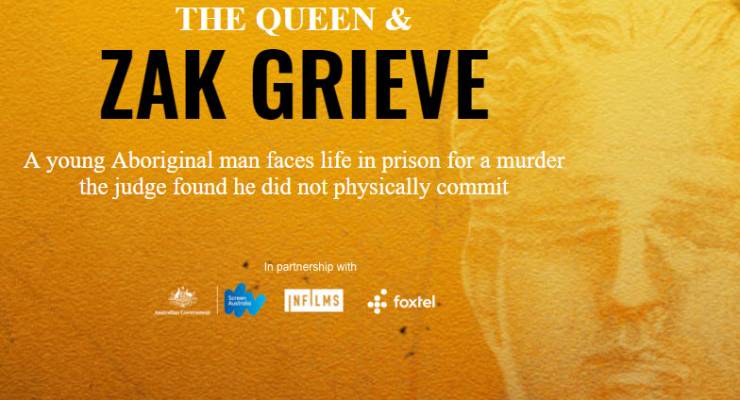
Why is nobody talking about The Queen and Zak Grieve? The Australian’s excellent six-part short-form documentary series, made in collaboration with Screen Australia, has barely registered a blip on the social media radar since premiering a couple of weeks ago, and is the subject of barely any news articles not published by the newspaper itself.
It is a deeply compelling and at times superbly made true-crime series, available online ahead of a chunkier, stitched-together, 90-minute version to be screened on Foxtel later this month. The presenter/writer is the Oz’s national crime reporter, Walkey award-winning Dan Box, who navigates potential legal and ethical minefields with an unflappably cool head.
Director Ivan O’Mahoney and his team were no doubt hoping for a water-cooler, Making a Murderer-esque sensation, this series revolving around a case with a much clearer injustice at its core. The titular indigenous man was 19 years old when he was convicted of the 2011 murder of Ray Niceforo, a fellow resident of Katherine in the Northern Territory.
The jury found Grieve guilty. He was given a life sentence, with a minimum non-parole period of 20 years. Incredibly, the judge who handed down the ruling, Justice Dean Mildren, determined that Grieve was not present when the murder took place, and thus could not have physically committed it. Mildren pointedly described the case as an “injustice”.
I’m being deliberately scant with details, given audiences might like to absorb them on their own terms — and this series is a fine way to do so. Suffice to say, more than one person was found guilty of murder, and Grieve’s injustice is tied to the NT’s mandatory sentencing laws.
[Why does mandatory sentencing for murder still run in the NT?]
The UK-born Box is an excellent, circumspect interviewer, who appears to intuitively understand when to gently probe his subjects, for the gradual teasing out of information, and when to pose direct challenges or assertions. He also understands the simple but profound power of the word “why?”.
He asks this in episode two when speaking to Niceforo’s mother-in-law, who describes the deceased man as “a gentlemen”. She elaborates on aspects of his personality and paints him with attributes.
“Not everyone in Katherine agrees with this assessment of Ray,” said the presenter, who then tracks down a local who recalls an altercation with Niceforo, which pries open the subject of his violent past — one of many smooth segues.
There are moments when it is abundantly clear that Box is a class act. Perhaps none more so than when the journalist finds himself at Grieve’s home spending time with Zak’s mother, Glenice. He earned the trust of the young man’s family, and it was trust well placed.
Glenice takes a call from Zak himself and puts him on loudspeaker. Here we have it: the very subject of the show, in jail for a murder his own trial judge said he couldn’t have committed, and he’s able and willing to talk. The camera crew are ready. For most journalists (or podcasters, vodcasters, filmmakers, etc) one word would surely come to mind: jackpot.
[Bowraville podcast picks up 4 Walkley nods as Oz muscles in on ABC turf]
But Box goes in the opposite direction. He speaks to Zak only to explain that the crew have inadvertently recorded bits of the conversation between he and his mum, and asks whether he grants his permission to potentially include bits of it. Then, instead of speaking to Grieve and getting answers straight from the horse’s mouth, Box retreats from the conversation entirely.
“Tempting as it is,” he explains via voiceover, “I decide not to ask Zak questions. Prison authorities have refused to let us interview Zak, and I’m worried about doing anything that can lead to him getting punished for talking to me.” In the next scene Glenice is clearly disappointed; after all, Zak wanted to talk. And why not? She asks, “What more can they do to him?”
This is hardly a common situation: the subject of a documentary suggesting a measure to make the film more dramatic, and the presenter/filmmaker rebuking them. The notable achievement here is not (or not only) that Box did what he believed was right. It is that he and O’Mahoney demonstrated it is possible for a documentary to be more, rather than less, interesting when it resists the expected path and the slam-bang, gotcha-style moments.
They keep a cool, sober head, and the series is better because of it. In the current era of “fake news”, climate change denialism, rabid partisanship and what feels like increasingly hysterical reportage in certain areas of the press, that’s not a bad message to send.
Box and O’Mahoney don’t quite succeed in creating an entirely satisfying ending to The Queen and Zak Grieve; given the limits imposed by real-life circumstances this was always going to be tough. They come commendably close, however, aided by the director’s sharp and interesting visual style, which includes some of the best drone photography I’ve seen in a true-crime program.
More impressive than any technical or stylistic prowess, however, is the skill and professionalism of its writer/presenter. Good interviews of any kind tend to be taken for granted; regarded as something anybody can do. They can’t. Here Box, among other things, reminds us that being a sensible interviewer is not the same as being a boring one. And again, that’s not a bad message to send.








Didn’t I read this week that Dan Box has gone home to the UK? Something about him not being welcome in Australia?
Do you need to be a subscriber to the Australian to watch it (link in article takes me to paywall site)? May wait til its on Foxtel if that’s the case.
The entire series is unlocked and free to watch on the Australian website. There’s lots of background reading, extended interviews and timelines also free and some exclusive subscriber only material.
Lack of access to it might be an issue Luke. Thanks for the review though, one of many injustices in regional Australia against a convenient indigenous person to solve a crime.